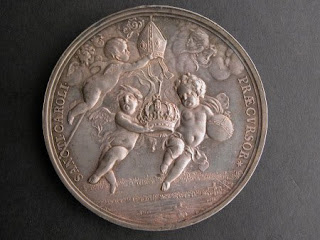"And under such superintendence": A Hackney Phalanx sermon at an 1824 episcopal consecration

Returning to John Lonsdale's sermon at the 1824 consecration of Blomfield for Chester , we see again an example of how the Hackney Phalanx, bearers of the Old High tradition, viewed the episcopal office. As with Lonsdale's sermon at an 1827 episcopal consecration, the complete absence of sacerdotal language is striking. And, again as with the 1827 sermon , there is the use of the language of "superintendence" to describe the episcopate. This is suggestive of the Hookerian moderation of the Old High understanding of the episcopate, reflecting how the Old High tradition sought to encourage episcopacy amongst non-episcopal continental Protestant churches. Also interesting at the outset of the extract is the implication of a cautious, modest account as to how episcopacy was understood to exercise oversight in succession to the Apostles. Well may the Church rejoice, and honestly may she glory, (since ordinary now occupy the place of extraordinary aids) when she ...





